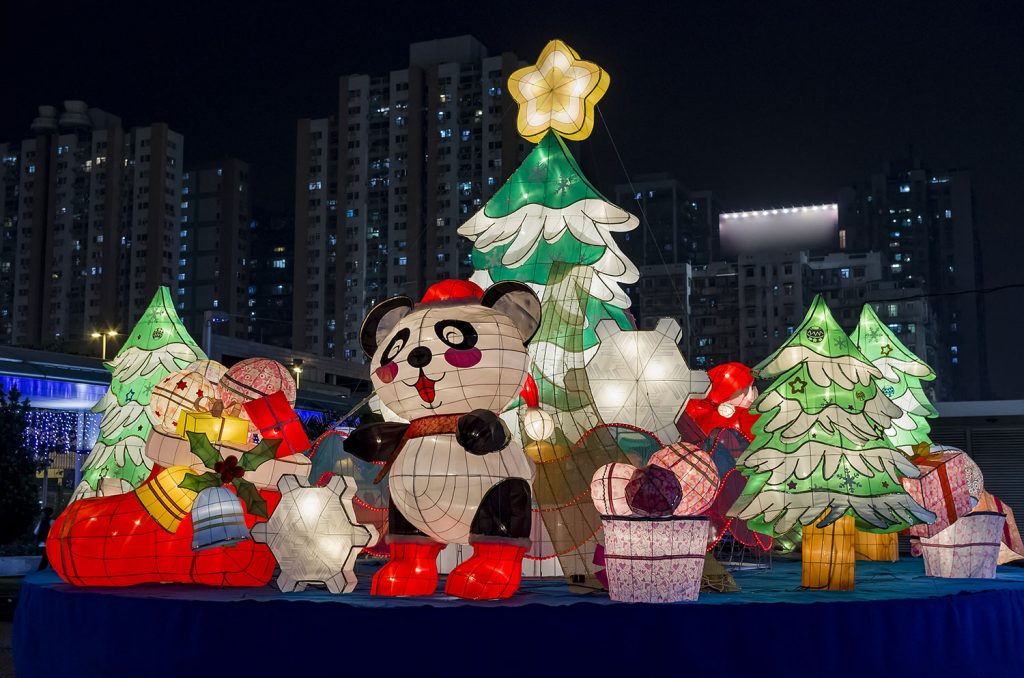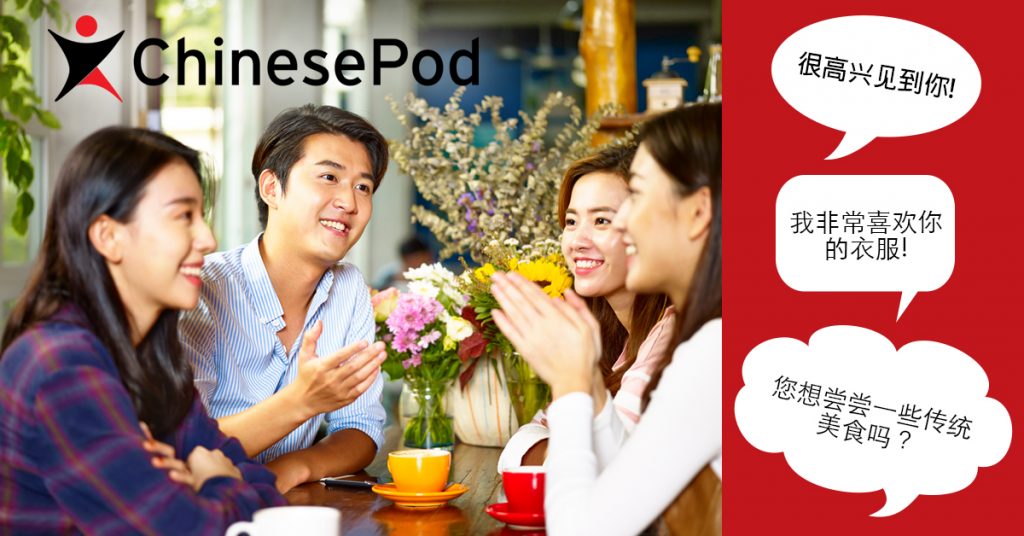Learning to Love Chinese Christmas
There is nothing like Christmas to show you the Chinese love of getting rènào 热闹. The potential to make a festival ‘hot’ (rè热) and ‘noisy’ (nào闹) is a key reason so many non-Chinese festivals are popular with young Chinese people today. Anglo-European festivals, like Christmas, have been very earnestly translated. Christmas, or Shèngdàn jié 圣诞节, literally means birth (dàn 诞) of the saint (shèng 圣). It can also mean birth of the ‘sacred‘ because of the Chinese language’s delightful ability to be interchangeable and ambiguous. My favourite translation was always fùhuó jié 复活节, or Easter, because it takes the tale of Jesus coming back from the grave to new literal limits. Fù 复 means again or return, and huó 活life, meaning Easter is the ‘coming back to life festival’. For me fùhuó jié always conjured images of zombies, but it at least reminds us that Easter is supposed to be about ‘rebirth’, rather than a bunny delivering chocolates. Despite the earnest translations however, and the growing number of Chinese Christians, Chinese Christmas is more a good excuse to gather with friends, eat a lot, and have a party, than it is a family or religious festival. Although even this development is fairly recent.
When I first moved to Beijing as an exchange student in 2003, I had an exam on Christmas day. Young and precocious, I complained to the teacher, and when my complaints were met with blank stares, I vowed to somehow celebrate Christmas nonetheless. SARS had just passed, and those Anglo-Europeans who could afford to leave China had gone. So, there was only a bedraggled group of students who felt the lack of Christmas festivities. I had a Japanese roommate who was sympathetic if not a little amused by my childish insistence on it being a very important day. As he explained it, Christmas in Japan was mostly a romantic thing like Valentine’s day, involving fried Chicken and strawberry cake. It had no religious or family connotations. Coming from Australia, I was excited to have my first Christmas in the snow. That year there had been unseasonally early snowfall, and it was just fresh enough, and the pollution was low enough, that Beijing looked sort of Christmassy.
After taking a 3-hour listening and writing exam in the morning, my American friend and I devised a plan to have what we thought would be some kind of cheeky fun. Smuggling beer in our bags, we triumphantly cracked open a bottle each as we walked out of the exam at 11:30am, winking like idiots at our bemused teacher. We then took a trip to the Lido Hotel, which was the only place where any decent import foods were available at the time. That night we and a few friends sat around some KFC and a few pieces of exorbitantly priced camembert cheese that had cost half the average Chinese monthly salary at that time. I was a Chinese Scholarship Council student then, earning about 1100 RMB a month, so we sliced and chewed the cheese religiously. Missing home, we were desperate to escape Chinese-ness in our celebrations. We broke rules of decorum that somehow represented ‘China’ to us on that day, and we ate food that seemed distant from Chinese cuisine.
The desire to escape China when reminded of ‘home’ on days like Christmas, could in some senses explain the phenomenon of ‘lǎowài 老外 behaving badly’, as my friend Sam calls it. Onetime in Guangzhou after a very boozy Christmas dinner, Sam’s friend proceeded to break into a life-size Christmas diorama and wrestle with the inanimate Santa Claus. As Sam said, ‘the xiǎoqū 小区 guards were bemused to say the least’. My own experiences parallel Sam’s, from men in Christmas bikinis running through the cold streets of Sanlitun to drunken Christmas karaoke, nothing says traditional festival away from home quite like silly behaviour.
The anthropologist Don Handelman explains how festivals and events can be categorised as either a model or mirror of society (1995). ‘Model’ events are transformative, they include ‘rites of passage’ like special birthdays, which go through a series of steps and have special rituals with their own internal logics. Bar mitzvah are a classic example of rites of passage. Mirror events, on the other hand, are designed to tell us something about society, they either ‘present’ an ideal version of what society should be, or they ‘re-present’ society to us in a different light. They portray society to us though a ‘what if’ scenario that helps us appreciate the ways everyday life functions. For example, Halloween has been interpreted as a day that says ‘what if everything was chaotic, or even supernatural’ and in doing so helps us re-present everyday life to ourselves. Re-presentational events are usually the most fun and cathartic, relying on a carnival-like breakdown of day to day rules. Another anthropologist, David Picard, suggests that festive and strange events help us make sense of our place in the world, and are existentially important (2016).
In North America, Australia and Britain, Christmas is supposed to present an ideal version of family life. Other European and Latin traditions have a combination of rituals that both present and re-present social life to their celebrants. See, for example, the demonic half-goat Krampus that terrorises neighbourhoods before Christmas in places like Austria. However, in the English-speaking world, Christmas is mostly portrayed as sitting around a big table, eating delicious foods, and giving gifts to loved ones. It is a utopian image of how we are all supposed to get along, even if we know it to be mostly untrue. Christmas is much like the Spring Festival (Chūnjié 春节) in China, which marks the start of a new year, and uses a similar group of little rituals and symbols to reflect what happy family life should be. Everyone sits together eating delicious food, and gifts of Hóngbāo 红包 are given to the children. The food and gifts are also symbolically loaded. Dumplings are made together, for example, because they supposedly resemble the Yuánbǎo 元宝, a form of ancient money. Eating them is said to bring wealth, while making and eating them together as a means to represent family unity.
If Christmas is typically meant to present ideal social life in Western countries, why do so many people go crazy when away from home? Perhaps we are re-presenting our lives in China to ourselves, by doing things that don’t fit into the typical Christmas mould, nor everyday life in China. At the same time, we are escaping some of the homesickness by making a mockery of certain kinds of nostalgia, like wrestling with Santa Claus. Without trying to justify or make too much of it, there appears to be some kind of logic behind why we are all so silly on Christmas day in China.
Since I first lived in China, Christmas has become something that many Chinese people celebrate, particularly the young. Either as a romantic excuse to go out to a foreign restaurant with your partner, or as an excuse to gorge yourself on non-Chinese foods with friends. Saxophone playing robotic Santas are stacked in small shopfronts around the country, and Christmas displays in major shopping centres welcome us into the Gregorian Calendar New Year. Even my Chinese friends who are not particularly bothered about Christmas say that it would be a bit weird not to eat some western food (xīcān 西餐) on Christmas. KFC, McDonalds and Pizza Hut all charge high prices for Christmas banquets, although people are increasingly going to hotel restaurants where they serve dishes more commonly ‘Christmassy’ overseas. To add to all this yuletide cheer, Christmas carols seem to play on repeat throughout major shopping centres. Taipei seems to be no exception, a friend of mine recently recounted how he sat alone on Christmas eve eating steak in a Táiběi niúpái台北牛排restaurant while Jingle bells línger xiǎng dīngdāng铃儿响叮当 played over and over. It was, as he said ‘horrific’.
I have grown to love the not-quite-right combinations of food, music and behaviour that makes up a Chinese Christmas. Somewhat like the occasionally surprising, funny, and poetic versions of English signage you see in China, Chinese Christmas never ceases to make my life more interesting. More importantly however, as Chinese-speakers become more powerful as consumers, the things they choose to consume, and the ways they choose to play, also suggest a lot about the ways they reflect upon their lives. In this regard, Christmas is a wonderful place to learn more about young Chinese aspirations. My friend Kieran recently recounted how young people in Kunming, much like ‘laowais behaving badly’, like to storm the centre of the city on Christmas Eve wearing Santa hats and spraying people with aerosol snow.
Since living in China I have moved to Japan, although I spend most of my time researching Chinese communities here. The wonderful and wacky logics of Chinese Christmas have carried over to Chinese life here, and it seems as though Chinese Christmas has become a transnational phenomenon. My favourite Chinese Christmas memory took place in Japan when I watched Santa Claus serenade Rudolph the red nose reindeer to the tune of ‘You are my little apple’ (xiǎo píng guǒ 小苹果) by ‘Chopstick Brothers’ (Kuàizi xiōngdì 筷子兄弟). My Chinese friend owns a bar in Tokyo, and invited me to a Christmas Eve party that featured a line-up of pantomime acts and prizes. Two women, one dressed as Santa the other as Rudolph, danced about on stage, in a silly parody of the original music video while Santa sang xiǎo píng guǒ to Rudolph. ‘Little apple’ was the CCTV song of 2014, and has since been repeated to earworm proportions. And yet, the lyrics of the song started to make eerie sense in the Christmas context. The lyrics of ‘little apple’ are as follows:
nǐ shì wǒ de xiǎo ya xiǎo píng guǒ ér
你是我的小呀小苹果儿
You are my little, my little apple
zěn me ài nǐ dōu bú xián duō
怎么爱你都不嫌多
How to love you? There’s no way to do it more
hóng hóng de xiǎo liǎn ér wēn nuǎn wǒ de xīn wō
红红的小脸儿温暖我的心窝
Little red face, warms my heart to the core
diǎn liàng wǒ shēng mìng de huǒ huǒ huǒ huǒ huǒ
点亮我生命的火 火火火火
You are the fire, fire, fire, fire, that lights up my life
The evening ended with a DJ playing dance music while Christmas visuals repeated on the LED display behind him and young people danced with Santa hats on.
Christmas has become a place where young Chinese people can revel and play with elements of a ‘foreign festival’ (Yáng jié 洋节), mixing it with pop culture trends in the Chinese-speaking world. It has become a popular time to go traveling for the young and wealthy, and candlelit meals (Zhúguāng wǎncān 烛光晚餐) over fried chicken, have become some of the favourite Christmas pastimes among the Chinese couples I know. Most of my friends, however, like to ‘crazily welcome’ kuánghuān 狂欢 Christmas with boozy parties, and playful parodies of Christmas-ness. Perhaps we might infer that, much like ‘laowais behaving badly’, Chinese Christmas has become a way to re-present young Chinese people’s place in the world to themselves. By playing with symbols of Christmas in their own way, and often taking it to transgressive extremes, maybe they are re-affirming the pleasures of Chinese everyday life, and Chinese festivities. Moreover, they have added an element of renao to Christmas that I have now grown to love.
Jamie Coates
Latest posts by Jamie Coates (see all)
- Learning to Love Chinese Christmas - December 12, 2016


